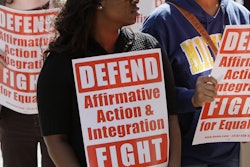Employers value active and applied learning experiences according to a new report from the Association of American Colleges and Universities (AAC&U).
“How College Contributes to Workforce Success: Employer Views on What Matters Most,” is the association’s seventh survey of executives and hiring managers. AAC&U found substantial support for the outcomes and experiences of a liberal education. Conducted in partnership with Hanover Research, the report examines the answers of 496 executives and hiring managers responsible for making hiring and promotion decisions at U.S. companies that range in size and industries.
“Much of the rhetoric around devaluing higher education—liberal education in particular—is focused on issues of employability,” said Dr. Lynn Pasquerella, president of AAC&U.
Pasquerella said the findings in this report counter the narrative that higher education doesn’t prepare students for success in their careers. She said that the report shows that employers value broad based liberal education, not only in a first job, but also for advancement.
There were some shifts in employer perception from the 2018 AAC&U report. While the largest response to confidence in higher education remains “great deal of confidence,” the percentage has shifted from 49% in 2018 to 41% in 2020. The percentage of those who answered “quite a lot of confidence” grew from 14% to 26%. The percentage of employers who think a college degree is “definitely worth it” grew from 42% to 49%.
“Employers are looking for a liberal education that prepares students for more than a specific job but provides the knowledge and skills important to work across sectors,” said Pasquerella, referencing how many of the people who lost jobs due to the coronavirus pandemic were able to utilize their skills in new contexts.
Among the skills developed in a liberal education noted as being very important to employers are the ability to work effectively in teams (62%), critical thinking skills (60%) and ability to analyze and interpret data (57%). Digital literacy was also impactful with 55% of employers noting it as very important and 36% noting somewhat important.














